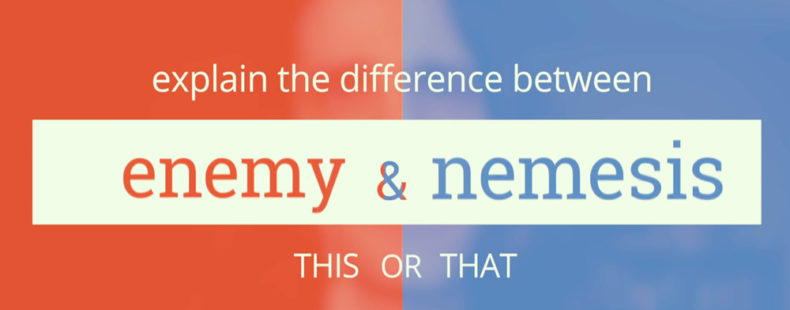WATCH: Explain The Difference Between Enemy vs. Nemesis
Who do you think would win an epic showdown like this one? We often see these words used interchangeably, but there are some subtle differences between them. An enemy is a foe who’s hostile toward the protagonist (or central character) of a story. A nemesis is an opponent or rival whom a protagonist can’t overcome.
The Enemy
In literature, an enemy is often referred to as an antagonist or a villain. This character is typically hostile toward the protagonist. They want to keep the protagonist from achieving a goal.
Sometimes you’ll also hear enemy used to refer to an armed foe, an opposing military force, or a hostile nation or state. This tends to pop up a lot in political discussions.
The Archenemy
In literature, as well as in comic books and movies, an archenemy is a supreme enemy. Conflict with an archenemy is always personal. You probably have a history with your archenemy. If you have an archenemy, the implication is that you have other, lesser enemies as well.
The Nemesis
Your nemesis is a far more intimidating figure than either an enemy or an archenemy. Enemies may come and go, but your nemesis is a more-or-less permanent fixture in your life. A nemesis pursues you relentlessly, often in search of vengeance. In fact, the word nemesis is comes from the Greek word némesis meaning a dealing out. This word comes from the verb némein meaning to dispense justice. The Greek goddess Nemesis was the goddess of divine retribution. She was also known as Adrasteia, meaning the inescapable.
A literary nemesis often seems to haunt the protagonist of a story. The protagonist and their nemesis often obsess about each other. One of the best known protagonist/nemesis pairings in literature is that of Sherlock Holmes and Professor Moriarty. Moriarty looms as a recurring threat throughout the Sherlock Holmes novels and stories. He’s the “Napoleon of crime” whom Holmes can never manage to best. Sherlock’s fascination with Moriarty is palpable in the way he describes him to Dr. Watson in The Valley of Fear: “But in calling Moriarty a criminal you are uttering libel in the eyes of the law—and there lie the glory and the wonder of it! The greatest schemer of all time, the organizer of every deviltry, the controlling brain of the underworld, a brain which might have made or marred the destiny of nations—that’s the man!”
A nemesis typically holds some degree of fascination for a protagonist, and vice versa. They’re an antagonist who’s bent on revenge, who doesn’t go away, and who seems to haunt the mind of the protagonist. They’ve moved past being an enemy to become something much more personal.














